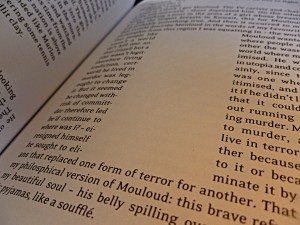The idea that revolution – real revolution – lies in an accumulation of minor changes in daily life, as opposed to violent uprisings in the streets, is finding increasing popularity, in particular among the media literate who proliferate trends with ever-increasing technical expertise. This idea is Adam Thirlwell’s point of departure in his most recent publication, Kapow!, a novel about the Arab Spring, set in Tahrir Square in 2011.
Accordingly, riots play only a minor role in the novel. For Thirlwell, the true needle bursting fundamentalist Islamic bubbles one after another, is pop culture. “Kapow!” spells out the cartoon sound for violence.
 Uprisings are both the backdrop and a metaphor for the story, which is a love triangle. Nigora, the heroine, is married to Rustam, a media-grouch, who stands for everything old, such as unfashionable gym socks, cassettes, and even burkas. Nigora finds herself increasingly attracted to Ahmad, a tech-savvy hipster in Brooklyn glasses, who makes movies on his digital camera. Ahmad believes that private life – meaning drugs and food, books and movies, fashion and sex – is “larger than the revolution.” It is. His activities have expanded his horizon beyond the borders of Egypt and they connect him in style and thinking with youth cultures around the world. → continue reading
Uprisings are both the backdrop and a metaphor for the story, which is a love triangle. Nigora, the heroine, is married to Rustam, a media-grouch, who stands for everything old, such as unfashionable gym socks, cassettes, and even burkas. Nigora finds herself increasingly attracted to Ahmad, a tech-savvy hipster in Brooklyn glasses, who makes movies on his digital camera. Ahmad believes that private life – meaning drugs and food, books and movies, fashion and sex – is “larger than the revolution.” It is. His activities have expanded his horizon beyond the borders of Egypt and they connect him in style and thinking with youth cultures around the world. → continue reading